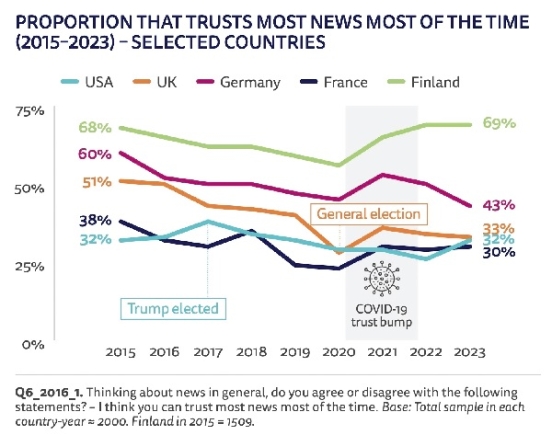
Everything you need to know about AI in 2023: the 6 must-read blogs
Winning photography competitions, inventing new materials, causing $100 billion falls in stock market value, and beating world champion drone racers. These are some of the things AI has achieved this year.
But not everyone is sold on generative AI. Concerns around data privacy, job security, bias and ethics are rife, and debate continues on all of these issues.
The World Economic Forum’s AI Governance Summit on 13-15 November brought together over 200 AI leaders to tackle issues around the impact artificial intelligence could have on jobs, security and the economy.
Infographic illustrating the viewpoints around artificial intelligence.
Here are six stories you need to read to get up to date on AI.
How is the World Economic Forum creating guardrails for Artificial Intelligence?
In response to the uncertainties surrounding generative AI and the need for robust AI governance frameworks to ensure responsible and beneficial outcomes for all, the Forum’s Centre for the Fourth Industrial Revolution (C4IR) has launched the AI Governance Alliance.
The Alliance will unite industry leaders, governments, academic institutions, and civil society organizations to champion responsible global design and release of transparent and inclusive AI systems.
How is AI going to change the job market?
AI is projected to create millions of new jobs. The World Economic Forum's Future of Jobs Report 2023 says that AI and machine learning specialists, data analysts and scientists, and digital transformation specialists are among the fastest-growing roles.
But artificial intelligence could also displace millions of people from their roles.
It cannot replace all roles – AI is unlikely to be able to do jobs requiring human skills such as judgement, creativity, physical dexterity and emotional intelligence. So, what jobs can’t AI replace?
Lists illustrating the top ten in fastest and declining jobs in growth.
Surveys conducted for the Future of Jobs Report suggest that the highest job growth in 2023-27 will be for agricultural equipment operators, for drivers of heavy trucks and buses, and for vocational education teachers. Mechanics and machinery repair workers follow in fourth place.
How is AI going to reshape the global economy?
Technology’s impact on productivity growth has been consistently overstated in the past, writes Boston Consulting Group for the Forum. Are analysts making the same mistake with generative AI?
Apparently so. Technological progress over recent decades has failed to lift growth rates in advanced economies such as the US because technology is only part of the picture – productivity growth needs to occur to see the real economic benefits.
Generative AI promises to change some of that. But to plausibly gauge its impact, we must take a closer look at the mechanisms that translate technology to broad productivity growth.
How is AI transforming the health sector?
Pandemics, a surge in chronic diseases, mental health concerns and an ageing population – the healthcare industry is facing multiple challenges alongside rising demand for high-quality healthcare.
However, AI and machine-learning technologies are already being used in areas from the development of drugs and vaccines to improving medical diagnosis and treatment, boosting efficiencies across the overall healthcare system.
The Forum’s Saemoon Yoon and Amara Amadiegwu asked six industry experts how they see AI and machine learning changing global health outcomes.
How is AI eroding trust in the media?
How can we build trustworthy media ecosystems in the age of AI and declining trust, asks Minos Bantourakis, Head of Media, Entertainment and Sport Industry at the Forum.
With great difficulty it seems, not least because trust in news media is already low, and declining. Only 40% of the population trust news, while concerns over disinformation are growing, with more than half of the population worried about fake news.
Graphs illustrating the proportion that trusts most news most of the time, selected countries.
Trust in the media is eroding as concerns over misinformation and disinformation persist. Image: Reuters Institute
But AI can help if used in the right way, says Jeff Jarvis, [former] Director of the Tow-Knight Center for Entrepreneurial Journalism at CUNY's Craig Newmark Graduate School of Journalism.
“To use generative AI to generate news is a mistake … Instead, machine learning and large language models can be useful in helping journalists organize their reporting, in extending literacy by helping some people tell their own stories, and in creating new ways for users to enter into dialogues with news. For journalism, artificial intelligence should be augmentative rather than generative."
How will AI disrupt the entertainment industry?
AI technologies are causing challenges for intellectual property rights in the entertainment industry. Creators and artists are debating with studios and technology companies over "fair use" of content to train AI models and how it affects compensation.
Legal actions have already started, but this discussion is just beginning. There is also debate on how the output of AI models should be treated by intellectual property and copyright laws.
Legal issues aside, expect more dead actors to start appearing in new films as digital avatars, synthetic voices – like Val Kilmer’s in Top Gun: Maverick – and more debate on AI-generated visuals and scripts.
What is happening with AI legislation in 2023?
The European Union is working on a new legal framework that aims to bolster regulations on the development and use of AI. This follows the release of a new AI Bill of Rights in the US in 2022.
The proposed EU legislation, the AI Act, will focus primarily on strengthening rules around data quality, transparency, human oversight and accountability. It also aims to address ethical questions and implementation challenges in various sectors.
But the proposal has met with mixed responses – in an open letter signed by more than 150 executives, European companies from Renault to Heineken warned of the impact the draft legislation could have on business on the grounds that it would jeopardize the region’s competitiveness without addressing the issues it aims to solve.